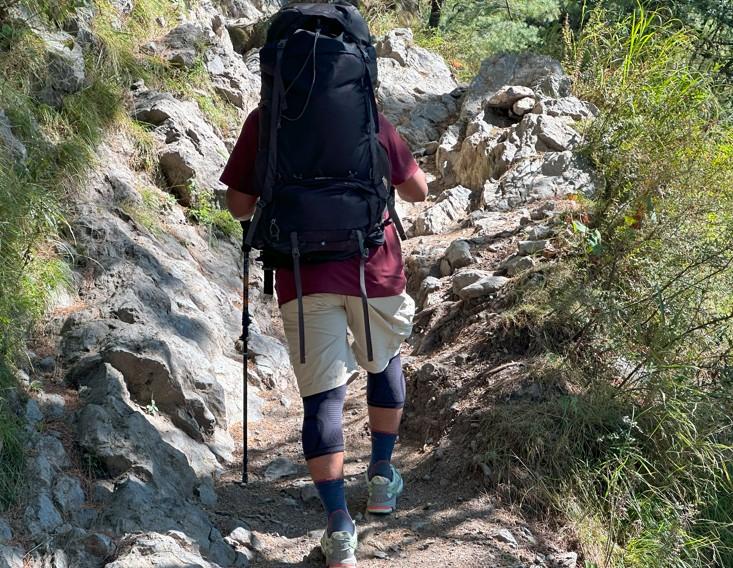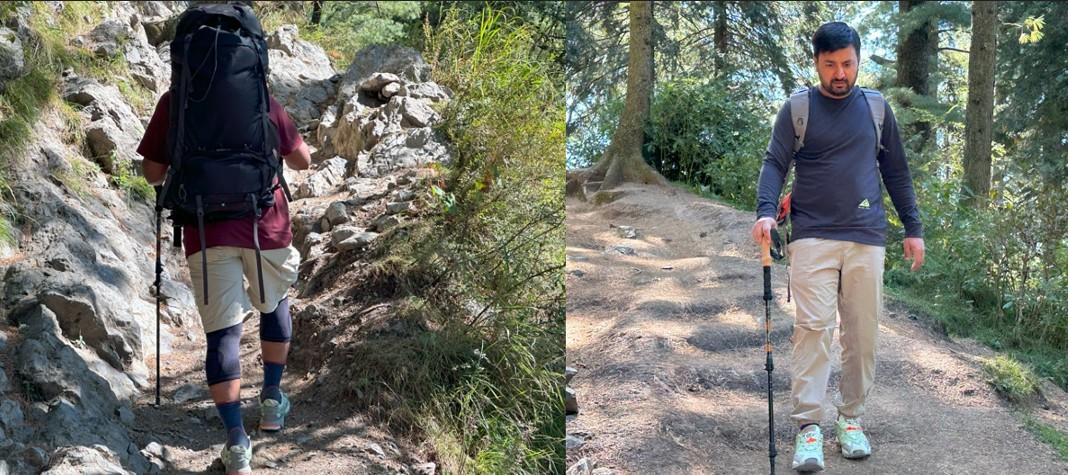If you’re a novice to the trails, chances are that you might be a bit confused by the terms hiking and backpacking. After all, you’ll often hear hikers throwing these terms around. As someone who’s been hiking for years, I’ve done both. Let’s check out the major differences between them.
Related: Hiking Vs Trekking: What is The Difference?
What is Considered Hiking?
Simply put, hiking is a trail walk that you can complete in a single day. You’ll carry a light pack containing just the basics. Think shorter forest trails, nature reserves, or ridgelines. Unlike backpacking, hiking is more accessible. It needs minimal prep, and you can easily head back home on the same day.
Related: What is Unparalleled Hiking
What is Considered Backpacking?
As the name suggests, backpacking entails carrying all your gear on your back. When I say longer, I mean spanning several days. You’ll need to carry your sleeping bag, tent, water filter, and any other essentials. Backpacking may be slower than hiking, but it’s more demanding and needs serious preparation.
Key Difference Between Hiking and Backpacking
Duration & Time Commitment
The most obvious difference between backpacking and hiking is the duration. Hikes can range from a couple of hours to a full day. Because they don’t normally require much planning other than mapping out a route map, hikes are ideal for beginners. They also work well for training or quick getaways.

Now, backpacking also means hiking, but it requires a multi-day commitment. I’ve also done week-long treks in remote areas where every ounce in my pack mattered.
Some backpacking routes like the Pacific Crest trail in California can even take up to six months.
Gear and Equipment
I always pack light for hiking: protein bars or trail mix, a hydration bladder, and maybe a light shell. If I’m exploring a new spot, I also make sure to download offline maps.
Backpacking is a whole other level. My 60L Osprey pack normally includes a sleeping bag, and my freestanding tent. Food-wise, I pack dehydrated dishes that I can cold soak along the way.
I also bring a Sawyer Squeeze to filter water. For me, this is lighter to carry than a Jetboil stove. Admittedly, the stove is quicker than cold soaking for rehydration, but it also requires carrying a cooking pot and fuel.
Planning and Preparation
Everyone plans their expedition differently. Generally-speaking though, I’d say that planning a hike is quick. I just have to pick a trail, check the weather, and do a quite GPS route scan if I don’t know the area.

When planning my backpacking expeditions, I need to prepare a topographic map and mark water resources.
On trips like the High Sierra Loop, I often need to cache food in advance and arrange for the necessary permits. For longer expeditions, I usually stock up on food and gear at stores along the trail. If there aren’t any stores around, I sometimes use resupply coordination services.
Is Backpacking Harder than Hiking?
Absolutely – backpacking is significantly harder than hiking. I’d say that while hiking pushes your legs and lungs, backpacking is a full-body workout through remote and often arduous terrains. You’ll carry up to 40 pounds day in and day out. You’ll also need to manage fatigue, stay alert, and set up camp for the night.
When you’re backpacking, you’re also at the mercy of the elements. You need to carry enough gear to be prepared for all circumstances.
It definitely demands the kind of resilience and endurance that hiking doesn’t. For me though, it’s also the more rewarding option.
Cost
Hiking is affordable. You only need decent shoes. Backpacking costs more since it requires more complex logistics and gear. You’ll need sleeping gear, food, a tent, and a quality pack. Budget backpacks cost between $100 and $200 while higher range ones can cost up to $300. You also need to budget for permit costs.
Backpacking vs Hiking Pros and Cons
What I like the most about hiking is that it’s simple and flexible. I can hit the trails on a whim. There’s no need for heavy gear or permits. Not only is hiking easy to plan, but it’s also a great way of building endurance. The lack of heavy gear means that I can cover more ground in less time.
Related: Is Hiking Dangerous?
On the flip side, hiking does have its limitations. Once the sun starts to set, it’s time to head back. You don’t get to stretch out your expedition.
With backpacking, I get to camp out in wild places. This allows me to plug into nature, wake up in the middle of nowhere, and really push myself. However, it does take more work and planning – not to mention a bigger budget. You also need to have the proper stamina for multi-day trips.
Hiking or Backpacking: Which is Right for You
This one is a no-brainer: if you don’t have a decent fitness level or experience, it’s important to start slow with short hiking trips. This will help you build both the skills and stamina that you’ll need for longer journeys. As you gradually increase your hiking trips, start adding a loaded pack to prepare for future backpacking expeditions.
Hiking is also an excellent option for those who are short on time. You can just hit the trails over the weekend. Backpacking demands more time and commitment. It can be far more rewarding since you’ll immerse yourself in nature.
Conclusion
Hiking and backpacking both take you outside, but they offer different experiences. Backpacking asks more from you, especially in terms of energy, investment, time, and effort. If you’re a beginner, you will find it’s easier to put a hiking trip together in no time.
At the end of the day, both backpacking and hiking have their place. I tend to hike when I want to move fast and clear my head. Backpacking is usually for when I want to go off-grid and slow down to properly enjoy nature. Backpacking builds patience and skill while hiking builds stamina. What truly matters is getting out there and learning what works for you.
Read More:
